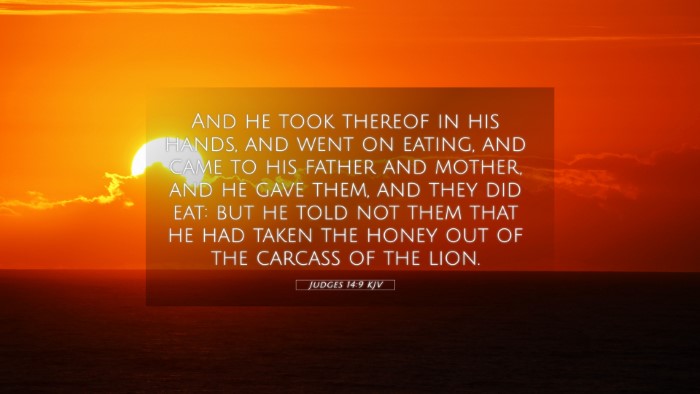Old Testament
Genesis Exodus Leviticus Numbers Deuteronomy Joshua Judges Ruth 1 Samuel 2 Samuel 1 Kings 2 Kings 1 Chronicles 2 Chronicles Ezra Nehemiah Esther Job Psalms Proverbs Ecclesiastes Song of Solomon Isaiah Jeremiah Lamentations Ezekiel Daniel Hosea Joel Amos Obadiah Jonah Micah Nahum Habakkuk Zephaniah Haggai Zechariah MalachiJudges 14:9 Similar Verses
Judges 14:9 Cross References
And he took thereof in his hands, and went on eating, and came to his father and mother, and he gave them, and they did eat: but he told not them that he had taken the honey out of the carcass of the lion.
Uncover the Rich Themes and Topics of This Bible Verse
Listed below are the Bible themes associated with Judges 14:9. We invite you to explore each theme to gain deeper insights into the Scriptures.
Judges 14:9 Cross Reference Verses
This section features a detailed cross-reference designed to enrich your understanding of the Scriptures. Below, you will find carefully selected verses that echo the themes and teachings related to Judges 14:9 KJV. Click on any image to explore detailed analyses of related Bible verses and uncover deeper theological insights.

1 Samuel 14:25 (KJV) »
And all they of the land came to a wood; and there was honey upon the ground.

Proverbs 25:15 (KJV) »
By long forbearing is a prince persuaded, and a soft tongue breaketh the bone.
Judges 14:9 Verse Analysis and Similar Verses
Understanding Judges 14:9
Judges 14:9 states:
"And he took thereof in his hands, and went on eating, and came to his father and mother, and he gave them, and they did eat: but he told not them that he had taken the honey out of the carcass of the lion."
Summary and Meaning
This verse occurs in the narrative of Samson, highlighting crucial aspects of his character and the themes of strength, defilement, and the hidden workings of God.
Context of the Verse
In the preceding passages, Samson encounters a lion, which he kills with bare hands, demonstrating his extraordinary strength. The honeycomb found later signifies the divine provision emerging from a situation seemingly devoid of life.
Key Insights from Commentaries
-
Matthew Henry:
Henry reflects on the symbolic meaning of Samson's actions. The honey signifies sweetness and sustenance amid death and decay, representing God's ability to bring goodness from what is cursed or unclean.
-
Albert Barnes:
Barnes emphasizes the significance of Samson not revealing the source of his honey to his parents. This action may illustrate aspects of disobedience to the Nazirite vow, which forbids touching unclean things.
-
Adam Clarke:
Clarke points out that this act symbolizes a deeper truth about the flesh versus the spirit. Samson's strength and subsequent folly reflect the tension between divine power and human weakness.
Bible Cross-References
Judges 14:9 connects powerfully with several other scriptures. Here are some related Bible verses worth exploring:
- Proverbs 25:16: “Hast thou found honey? Eat so much as is sufficient for thee, lest thou be filled therewith, and vomit it.”
- Numbers 6:6-7: Discusses the Nazirite vow and the prohibition against touching dead bodies.
- 1 Peter 2:9: “But ye are a chosen generation, a royal priesthood, an holy nation, a peculiar people...” This reflects the idea of being set apart.
- Romans 12:1-2: Calls on believers to present their bodies as living sacrifices, contrasting fleshly desires.
- Hebrews 11:32-34: Mentions Samson among the heroes of faith, affirming his complex narrative.
- John 10:10: “I am come that they might have life, and that they might have it more abundantly,” reflecting the goodness from death.
- Matthew 5:14: “Ye are the light of the world. A city that is set on a hill cannot be hid,” illustrating the idea of being a beacon of divine sweetness in a fallen world.
Thematic Connections
The themes present in Judges 14:9 can be traced throughout scripture relating to:
- The tension between life and death.
- The purity versus defilement debate.
- The divine provision found in bleak circumstances.
- The role of secrets and revelations in one's relationship with their heritage.
Tools for Bible Cross-Referencing
Utilizing tools for Bible cross-referencing can enhance understanding:
- Concordance: A comprehensive index to find key terms and their occurrences in scripture.
- Cross-reference guide: Provides thematic connections between verses.
- Study methods: Using cross-referenced themes to dig deeper into the word of God.
Conclusion
In conclusion, Judges 14:9 offers rich layers of meaning reflecting God's providence amid human actions. The interplay of uncleanness and sweetness serves as a profound reminder that God's purposes often unfold in unexpected ways. For those seeking to explore the intricate connections between Bible verses, understanding this verse sets a compelling pathway into a deeper study of biblical themes and narratives.


